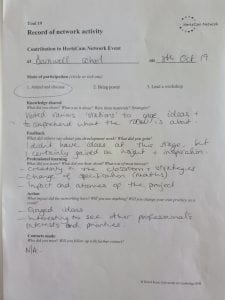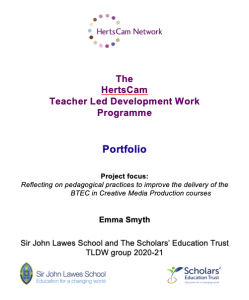
Vignette
My main concern was that we had some spurious and disappointing results from our 2018/2020 cohort in 2019. We are usually a very high achieving faculty and this qualification usually gets great results; the year before we had a student achieve D*D*D* – the highest grade awarded. Another concern I had was that some staff and students at the school didn’t have a positive attitude towards the BTEC qualifications which was making recruitment at times hard, and also making those who had opted to take the course to feeling, at times, inadequate and isolated.
I felt the best course of action was to reflect on pedagogical practices to improve the delivery of the BTEC Creative Media Production courses, particularly the units that carried more Guided Learning Hours, external assessments and multiple linked units, but to also explore ways of improving the reputation of the BTEC courses in the school community. I explored a range of strategies from interviewing/questioning students and colleagues to presenting ideas at a Middle Leaders Meeting.
The outcomes were varied, but included leading the faculty to improve the delivery of many Units including updating the scheme of work, lessons and assessment preparation, as well as the creation of an assembly/presentation to deliver to next year’s cohort of Year 11s as a recruitment tool.
Final TLDW meeting – 27th June 2020
This was the final and virtual (due to the pandemic) International Hertscam meeting. These are some notes that I found useful; there is a summary at the end.
Opening Session:
Networking activity; Address from Dr David Frost founding trustee of HertsCam and founder of the concept of non-positional teacher leadership
Non-positional teacher leadership; even though I am a Middle Leader, teachers in the team such as CBC and ZOL, who do not hold leadership positions, have helped to lead this change and parts of my focus, which I am grateful for. We have all been empowered by this project to carry out positive change on the BTEC course. We have knowledge shared, offered each other moral support and I hope, at times have inspired each other too.
Emma Payne stated that TLDW participants have had to adapt their project due to the pandemic, which is certainly true of my project. Something that I have had to consider during my project is to adapt and overcome, especially with strange circumstances.
Gallery Walks
This was an opportunity to engage with presentations of plans for development work by HertsCam MEd participants
- Focus: Developing the leadership skills of middle leaders.
Due to a top down approach, middle leaders have become managers rather than leaders and there is a lack of time and opportunity. This raised many questions – see below – but also was a great opportunity to see what the MEd students were doing. It was also a great chance to see what other areas in other schools, colleagues are focusing on/needing change.
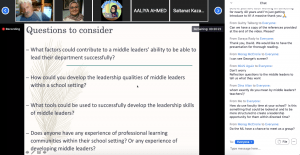
2. Developing strategies to increase the dialogue from Years 7 – 11 and the 6th form; due to a lack of uptake and numbers in the 6th form – problem of recruitment due to a local college offering the same courses.
I offered a suggestion about having a USP like we have with the Triple BTEC course – something linking into my project, as well as giving 6th formers more opportunities to meet the lower school such as running events or getting involved in enrichment days.

Sustaining school improvement: Presentations from school leaders and facilitators
- Hannah Trickett, Maple Cross Junior Mixed Infant & Nursery School Rickmansworth, UK
TLDW allows you time to stop and pause and to think about how we can implement change in our school, culture and context. But also having patience and to have the confidence as a participant to drive change. TLDW allows passion and honesty to flow throughout; this resonated with me as it wasn’t necessarily about the students – it was about what I wanted to do too. - Dr Amina Eltemamy – Director of Cairocam and Hoda Mattar, Alhoda International School, Cairo, Egypt
Achieving sustainable school improvement and to make a difference to students. The TLDW acts a a model for rethinking learning. This gives us the opportunity to communicate and collaborate. This is all very true of my experience of the project. - Dr Gulmira Qanay, Graduate School of Education Nazarbayev University (NUGSE), Kazakhstan, Zaida Mauletova, School-gymnasium №8, Almaty, Kazakhstan and Gulnara Talasspayeva, School-gymnasium №17, Kokshetau, Kazakhstan.
Facilitating teacher leadership is about enabling teachers to reach their full potential. I feel that the TLDW project has certainly given me a bit more time to focus on me as a teacher, instead of getting lost at times in amongst the school year!
Facilitation is about active listening and providing feedback; this consultation process allows teachers to hone in and get an insight into what needs changing, and then we can act on it and do something about it.
- Morag McCrorie, Head of Secondary, Nexus International School, Kuala Lumpur, Malaysia Focus is on collaboration and being a part of a professional learning community. Referenced sustainable learning
Thematic Seminars:
- Remote Learning
Presenter 1: How to make online learning more interesting to students – changed due to Covid pandemic. Students resisting change and doing work out of their comfort zone and especially lacking in computer skills. Sources used included: Quizzes, Edpuzzle, Google Docs and Google Slides, focus on interactivity, virtual labs in science lessons. Attendance improved, work handed in improved and missed assignments declined.
Presenter 2: Developing strategies to improve student’s and teachers’ digital skills. Problems included a lack of Digital literacy, digital/computer skills, limited usage of resources online. Some strategies used included Online seminars and webinars, and a creating website to host material for online learning. Motivation was increased amongst students and staff were more confident with using technology.
Presenter 3: Making notes electronically/online learning. Tinker.com – computing online resource. There was more engagement as there were no classroom distractions. however, there were technical issues, but also some lack of engagement despite parental contact and HOY intervention. How do we develop blended learning after Covid-19 pandemic? Employ good digital strategies for the future. Parental engagement needs to be stronger in the future – is this something we can rely on? Frustration, don’t know how to be a teacher, have also got their own jobs to do! Praises, as well as concerns, were emailed.
Seesaw, Tapestry are other resources to use; help guides, Looms, use of videos.
Group work: Office 365 shared documents, Google Docs, Breakout rooms, shared whiteboard, padlet.
2. Vulnerable Learners
Presenter 1: Enhancing self esteem of students with learning difficulties. Online learning was an issue; one to one work was impactful, use of eye contact is important. Find their niche and ‘talent’ to show case and incorporate it in lessons to allow them to ‘shine’ and gain confidence. 2 sides; academic/success side, but also the social side – get them on side socially first, in order to progress academically – more group work, increase self esteem, use them as model students because of this.
Presenter 2: Promoting extra-curricular activities amongst weaker students. How can students be motivated to take up these opportunities rather than listening to music or playing video games in their spare time. Take up of extra-curricular activities impacts academic performance and helps them to develop skills and to be more motivated. Use of social networks to be adaptable during distanced learning. Should extra-curricular activities be made compulsory? OFSTED review this; could this be something we employ more in our faculty?
Presenter 3: Developing strategies for SEN students in MFL and creating more of a provision for them. Links to OFSTED and focus. Strategies include scaffolding, games to make learning more accessible, use of images and visuals to support learning, breaking down language or a topic into chunks; strategies that potentially could be employed on the BTEC course more so as we naturally attract more vulnerable and students with SEN due to the lower offer.
Close and Reflections
- Further opportunities include studying for the MEd.
- Become a TLDW facilitator.
- TLDW Diploma programme.
- Visit www.internationalteacherleadership.org
Cathy Barr – closing remarks:
Teacher’s are great problem solvers.
A more blended approach to learning – for teachers and students!
Summary
This was an insightful conference; not only has it allowed me to be confident about the impact of my project, it has also reignited my love for teaching and I look forward to making more of an impact next academic year. It has made me appreciate the many different facets to teaching, but also the fact that anyone can lead change, any where within a school.
Year 12 mock exam results/actual exam performance
With the impact of lockdown due to the Covid 19 pandemic, external public exams for students were cancelled. However, as a school, students still undertook mock exams. Although these were obviously completed in very different circumstances, the results are much more positive. I should note however, that we cannot verify how long students spent on the exam, whether they received help, or used extra resources during it.
Unit 5:
x2 Distinctions
x5 Merits
x1 U; this was a technical computer error and the student is resitting this at the end of June.
These are much more positive results than the NP and P grades we received last year.
Unit 1:
x14 D
x2 M
x1 P
x2 U grades as these students had clearly accessed the suggested points on the mark scheme to help write their answer; they are to retake the exam at the end of June.
These are obviously much more pleasing, but it is a real shame that these students won’t actually get to sit the actual exam due to the pandemic. However, I am confident that the strategies that have been put in place to improve on last year’s performance have clearly worked; the legacy of this project will certainly live on!
Summative Reflection
This reflection has been broken into a number of different sections; I will begin reflecting on the TLDW group experience.
Reflections on the TLDW group experience
On the whole, I have found these experiences to be fairly useful. As my project is quite specific and embedded in my faculty, and the fact that very few people have an understanding of the BTEC course and its logistics within the school, I have found it quite valuable listening to my colleagues points of view, opinions and suggestions as they have offered fresh perspectives and offered things that I may not have necessarily considered before.
I found the reflective parts of the session very helpful as this allowed me, during some hard times and overworked times, to get excited about my project again, but to also see light at the end of the tunnel and to pick up momentum with moving forward again to drive an important change within my faculty.
I found the discursive opportunities in our sessions to be very helpful, particularly with a wide range of colleagues; where it be from different faculties, experiences, ages, and leadership backgrounds. The TLDW mentors have been very supportive and approachable, but also have the experience and knowledge to really guide me through the process.
My own learning through participation
This links in with the TLDW sessions as there were plenty of opportunities to think about learning, but I particularly enjoyed this. As a teacher, you constantly think about student’s learning, and as a middle leader, you think about your team’s learning and progression, and not necessarily yourself. This experience has made me realise that I love to learn and that to become a better teacher, you need to not only learn about yourself, your leadership style and how to drive change, but also how you learn/your learning styles (which we do so much for our students, but not for ourselves).
Being a Head of Faculty, you can sometimes get so caught up with your to-do list, Self-Evaluation Form, School Targets, Departmental and School Development Plan, as well as your own classroom teaching, and not to mention more menial tasks such as placing stationery orders, that you can sometimes lost sight of your purpose. My participation in this project has allowed me to have time to reflect on the purpose of it (Primarily the structure and delivery of the BTEC creative Media courses) but to also prioritise key factors that can be easily implemented that can have a meaningful impact.
The impact of your development work
I hope that the impact of my work is two-fold; firstly a more developed, robust, coherent and organised BTEC programme of study that takes into account teacher strengths, the correct amount of Guided Learning Hours, engaging lesson content and activities, and of course, better student outcomes. As McDougall states, “Again, we must remember that a National Diploma course is highly theoretical and reflective, despite attempts to present it otherwise.” (McDougall, 2006:4) I hope that the impact of this development work means that the course will be taken seriously amongst staff, students and parents alike, but also the fact that I have enabled the course to be on par with the A Level due to schemes of work and lesson changes. Secondly, I hope that I have and will continue to raise the profile of BTEC qualifications amongst the school community at SJL. Even back in 1985, media critic Len Masterman, also named the father of Media Studies states that ‘”We shall need to be not simply teachers of, but advocates for our subject, advancing its cause whenever we can within our own institutions, amongst parents and with colleagues and policy makers”, (Masterman, 1985: 1) and I hope that this outcome does just this.
Issues, obstacles and challenges
Time has been one of the biggest obstacles; being a teacher is not only a demanding job, but also the workload of planning and marking and keeping up with specification changes is difficult, let alone running a faculty, with 2 new members of staff this year. However, having dedicated time to complete the project and constructing an action plan has really aided this.
Something I also found difficult and challenging was some of the ignorance of staff around what a BTEC qualification is/does. This made me and the faculty felt somewhat devalued, and made me sympathise with Buckingham; “Yet in the core of the school curriculum – at least in the UK – there is still little more than a token recognition of its [media education] importance,” (Buckingham, 2003:ix), something I had read years earlier when writing my final dissertation on the perception of Media Studies in secondary schools when studying for my PGCE. He goes on to say “It is still common for popular commentators on education, and some media professional to dismiss media education on the basis of prejudice and ignorance; and despite occasional signs of commitment to the field, policy-makers still appear to be ill-informed about its basic aims and methods.” (Buckingham, 2003:ix) 17 years on after this was written, and after at least 2 curriculum changes, I am still facing the same challenges!
One of the biggest challenges/obstacles was trying to get very busy people – both students and teachers to participate – whether that was filling in a questionnaire, trying to organise a focus group or conduct a survey. The Covid-19 pandemic and lockdown of schools also severely impacted on some of the things I wanted to undertake – such as lesson observations and learning walks – however, I have tried to overcome these by thinking about how I can tackle these things remotely; one way I have done this by liaising with the Head of Business and have reviewed her Schemes of Learning and some lessons via our school website/online access. However, some of the results from the surveys (only a couple of responses) could invalidate the results, but can still be used as evidence if not thought about in a vacuum.
Overall outcomes
I have placed this in a separate blog post, but have also summarised and included them here:
Outcome 1:
Unit 4, 10 and 21 now link up better and have revamped to be more thorough, and now have more of a balance of teacher led content, engaging activities as well as producing the written report/powerpoint and then practical work.
Outcome 2:
Unit 2 has been redesigned (theoretically due to the pandemic) and many contacts have been made to help deliver a careers day to allow students to write a better informed report for Learning Aims A and B. Hopefully this can be delivered when we are back to ‘normal’ (?!).
Outcome 3:
Better split of time amongst the units to allow for the correct amount of GLH (Guided Learning Hours) and better exam preparation. It’s a shame we do not have actual exam results due to them being cancelled due to the Coronavirus pandemic, however, we ran Year 12 mock exams for both Units 1 and 5 this year and overall, students performed better on these this year, compared to the actual results from last year.
Outcome 4:
Re-educating students and staff about what BTEC is about is something that I feel very strongly and passionate about, and this is something that I kind of stumbled upon along the way; various comments from SLT, other members of staff, and especially some current Year 10 students. I have therefore taken it upon myself to design a presentation that will be delivered in a Year 11 assembly; this could be done remotely for the current year 10 since we are in lockdown – to help break the stigma.
Outcome 5:
More standardised teaching and delivery between Business and Media Studies – this still needs more development as I was unable to get into the classroom to perform observations; however, what has been useful is liaising with ADU, Head of Business, as well as reviewing their SOL and lessons. I think there is more scope for development here, as our course seems to be a bit more streamlined and better designed, now that we have reviewed it – perhaps a meeting is needed in the future where I can pass on some suggestions?
Outcome 6:
Again, this is something that will need work, but there have been various suggestions about introducing a third Extended Certificate Course (equivalent to 1 A Level) to offer a full BTEC provision (students at the moment can take 2 of these courses + 1 A Level). I think this is something that the school and GWI are interested in, however, I think that the choice of subject will need to be picked carefully, but also some staff may need more persuasion as there is a lot of paperwork and setting up of a new course involved, and I think this is why a lot of previous courses were shut down; PE, Science for instance. Subjects on offer that don’t necessary require specific equipment/resources include: Applied Science, Applied Psychology, Art and Design, Computing, Information Technology, Marketing, Music, Performing Arts, Sport (there are many course here), Travel and Tourism etc. The full list can be found here: https://qualifications.pearson.com/en/qualifications/btec-nationals.html
I think this is something that I can make SLT and Heads of 6th form aware of, but my influence stops there.
Future of the development work
Aforementioned, I think it could be useful to have more liaison between myself and the Head of Business to perhaps discuss approaches to the course and to teaching and learning, as we do get, sometimes, the same students taking these courses and it could be useful to develop a more standardised approach.
Secondly, aforementioned, the introduction of a third BTEC Extended Certificate Course may be beneficial for the school and students in delivering a more tailored programme of study.
Thirdly, I think it would be useful to be constantly reviewing the BTEC Creative Media Production courses as there are units (27, 8, 17, 6, 15 for instance) that are still yet to be appraised – and haven’t been for a while. To want to improve the delivery of the course further can only impact the student’s outcomes positively.
Fourthly, I hope that there is an implemented legacy – whether that’s with Year 11, current 6th form students, or with staff, that BTEC qualifications are not necessarily softer options for lesser able students, but are simply a different approach to a Level 3 qualification, that is equivalent to an A Level programme of study, that anybody can undertake.
Furthermore, I would like this blog to have public access to allow other teachers to access my work.
References
- Buckingham. D., “Media Education; Literacy, Learning and Contemporary Culture,” Polity, Cambridge, 2003.
- Masterman, L., “Teaching the Media”, Routledge, London 1992.
- McDougall, J., “The Media Teacher’s Book“, Hodder Arnold, London, 2016
Outcomes/Taking the Development Work Forward – Tool 54
Tool 54, Taking the Development Work Forward, and thinking about how the development work will continue to impact in the future, can be found here:
Tool 54 taking the development work forward
Furthermore, I have summarised the outcomes of my TLDW below:
Outcome 1:
Unit 4, 10 and 21 now link up better and have revamped to be more thorough, and now have more of a balance of teacher led content, engaging activities as well as producing the written report/powerpoint and then practical work. This has
Outcome 2:
Unit 2 has been redesigned (theoretically) and many contacts have been made to help deliver a careers day to allow students to write a better informed report for Learning Aims A and B. Hopefully this can be delivered when we are back to ‘normal’ (?!).
Outcome 3:
Better split of time amongst the units to allow for the correct amount of GLH (Guided Learning Hours) and better exam preparation. It’s a shame we do not have actual exam results due to them being cancelled due to the Coronavirus pandemic, however, we ran Year 12 mock exams for both Units 1 and 5 this year and overall, students performed better on these this year, compared to the actual results from last year.
Outcome 4:
Re-educating students and staff about what BTEC is about is something that I feel very strongly and passionate about, and this is something that I kind of stumbled upon along the way; various comments from SLT, other members of staff, and especially some current Year 10 students. I have therefore taken it upon myself to design a presentation that will be delivered in a Year 11 assembly; this could be done remotely for the current year 10 since we are in lockdown – to help break the stigma. The presentation can be found here: TLDW Presentation to Year 11 students
Outcome 5:
More standardised teaching and delivery between Business and Media Studies – this still needs more development as I was unable to get into the classroom to perform observations; however, what has been useful is liaising with ADU, Head of Business, as well as reviewing their SOL and lessons. I think there is more scope for development here, as our course seems to be a bit more streamlined and better designed, now that we have reviewed it – perhaps a meeting is needed in the future where I can pass on some suggestions?
Outcome 6:
Again, this is something that will need work, but there have been various suggestions about introducing a third Extended Certificate Course (equivalent to 1 A Level) to offer a full BTEC provision (students at the moment can take 2 of these courses + 1 A Level). I think this is something that the school and GWI are interested in, however, I think that the choice of subject will need to be picked carefully, but also some staff may need more persuasion as there is a lot of paperwork and setting up of a new course involved, and I think this is why a lot of previous courses were shut down; PE, Science for instance. Subjects on offer that don’t necessary require specific equipment/resources include: Applied Science, Applied Psychology, Art and Design, Computing, Information Technology, Marketing, Music, Performing Arts, Sport (there are many course here), Travel and Tourism etc. The full list can be found here: https://qualifications.pearson.com/en/qualifications/btec-nationals.html
I think this is something that I can make SLT and Heads of 6th form aware of, but my influence stops there.
References
Books
- Alvarado, M., and Boyd-Barrett, O., “Media Education, An Introduction,” BFI, London, 1992.
- Buckingham. D., “Media Education; Literacy, Learning and Contemporary Culture,” Polity, Cambridge, 2003.
- Burn, A., and Durran, J., “Media Literacy in Schools; Practice, Production and Progression“, Paul Chapman Publishing, London, 2007.
- Gauntlett, D., “Making Media Studies: The Creativity Turn in Media and Communications Studies,” Peter Lang, New York, 2015.
- Masterman, L., “Teaching the Media”, Routledge, London 1992.
- McDougall, J., “The Media Teacher’s Book“, Hodder Arnold, London, 2016
- O’Sullivan, T., et al, “Studying the Media; An Introduction,” Hodder Arnold, London, 1996.
Publications/journals
- Frost, D., “Improving the quality of education through teacher leadership: a non-positional approach”, 2014.
- Fullan, M., “Why teachers must become change agents, Educational Leadership“, 1993.
- Wilshaw, M., “Ofsted Annual Report”, UK, 2012.
Websites
- Bath College, https://www.bathcollege.ac.uk/help-advice/qualifications-explained/ucas-points-explained, “Ucas Points Explained”, accessed 2020.
- Holford, A., https://www.theguardian.com/higher-education-network/2017/nov/29/students-with-btecs-do-worse-at-university-heres-how-we-close-the-gap, “Students with BTECs do worse at university – here’s how we close the gap”, November 2019.
- North Kent College, https://www.northkent.ac.uk/news-and-events/blog/155/how-you-can-still-go-to-university-with-a-btec#:~:text=Some%20universities%20have%20been%20historically,year%2C%20with%20the%20number%20steadily , “How you can still go to university with a BTEC“, 2016; Originally from Williams, V. S., “Are BTECs as Valuable as A-Levels?”, https://www.whatuni.com/advice/applying-to-uni/are-btecs-as-valuable-as-a-levels/48605/?platform=hootsuite, 2014.
- Nelson, F., https://blogs.spectator.co.uk/2016/09/problem-btecs-response-pearson-plc/ , “The problem with Btecs – a response to Pearson Plc“, September 2016.
- Pearson Education Ltd, https://qualifications.pearson.com/en/qualifications/btec-nationals/creative-digital-media-production-2016.html, ” BTEC Nationals Creative Digital Media Production (2016)“, accessed 2020.
- Pearson Education Ltd, https://qualifications.pearson.com/en/qualifications/btec-nationals.html, “BTEC Nationals”, accessed 2020.
- UCAS, “Progression Pathways 2016“, https://www.ucas.com/file/53616/download?token=vUSPEhh6, accessed 2020.
Comparing to the delivery of the Business Extended Diploma
With the permission of ADU, Head of Business and Economics, I have been doing some comparison between the organisation of the BTEC Business Extended Diploma course, schemes of work and specific lesson content.
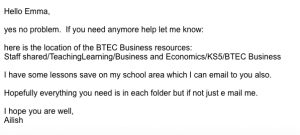
So, my first port of call was just to compare resourcing and organisation; ie. paperwork, forms and the like, and I can honestly say that it is very organised and well labelled! Something I will need to ask from an organisational point of view is whether or not the MYBTEC online system is used; we have used this, but with 2 new members of staff starting, with minimal changes to the content of the work so far, I hadn’t felt it to be of much value. ACTION: However, with further revamping of other units, and not being sampled for student work this year due to the Covid-19 pandemic, as well as external assessments and some internal assessments being cancelled, makes me wonder if this is an opportune moment to get the system up and running, make the tweaks in a bit of the gained time I have, and to just have the more robust, reliable and approved organisational systems back in place – this is something up for further discussion with the Media faculty over the coming weeks or even in September.
During my exploration of resources, I found a folder containing exemplar learner work – I wonder how often ADU uses this within lessons. This is something that we do show to students, only for a minimal amount of time to minimise the potential of plagiarism as our briefs do not change year on year; this is potentially an option for us, but will increase teacher workload each year, and also, apart from changing the format of the work produced (report, presentation, blog, vlog etc), the list of criteria in the specification to cover and the marking criteria does not change, so the content will still be the same. ACTION: Perhaps this is something we can review and build in a little more time at the start of units so that students get a real good look at what needs to be produced. Perhaps it is also something we can use to remind ourselves of what we are looking for in a piece of work; particularly if the work has been Internally Verified (IV’d) or Standards Verified (SV’d).
In terms of Schemes of Work/Learning, Pearson provide rough overviews of how to deliver the course content, along with the Guided Learning Hours (GLH). It is interesting from my browsing that Business have used the Pearson provided Schemes – example below: BTEC16_NAT_BUS_SOW_U3_ADU
In the past, we have downloaded these, perused, and found that their content seems to be quite vague, broad, contains a lack of activities (that are engaging) and is very lecture/teacher led – probably beneficial in a college setting; this doesn’t fit what SJL look for in lessons, our teaching styles and also what students enjoy. So, from this, as a faculty and individual teachers, we have taken inspiration from these schemes and have adapted them – see below:
Pearson provided scheme: BTEC16_NAT_CMEDIA_SOW_U03
My adapted, more in depth, student friendly and engaging scheme of learning: unit 3 overview
My adapted 84 slide preparation powerpoint to last several months (120 GLH) and to include recapping key digital media skills (title of the exam) and undertaking of 2 mocks with feedback: Unit 3 lessons and prep
ACTION: I feel that perhaps there needs to be a more standardised approach to teaching these qualifications; I feel we are doing it right – but then I would say that – and perhaps thee need to be independently observed and pursued further – GWI would be idea as the Quality Nominee (QN) of the school who is in charge of BTEC delivery at SJL
I then drilled in to specific lessons and content and wanted to compare it to some of our lessons. I know as practitioners we are all taught differently, and have pursued different routes into teaching, but undertaking a PGCE 10 years ago, I was taught to include a 4 part lesson;
Starter– to include the aims/outcomes of the lesson and a warm up activity to recap prior learning or to gage what students already know or a short task to introduce a new topic.
Exposition – the reasons why we are undertaking the lesson, introduction to key concepts of the lesson, defining key terms
Main learning activity – Takes the bulk of the lesson; a series of activities to get students learning and practicing the application of the new concept/information – could include mini plenaries or formative assessments
Plenary – A formative assessment activity to gage what students have learnt from the lesson; could inform extension work, homework and the next lesson.
I like to think that in my lessons, resources and in particular my Powerpoints/presentations, that this is clearly signposted.
I took a recent lesson that ADU had sent me as we had an email interaction about engaging BTEC students and encouraging them to access the higher, Distinction criteria, and that some either found this difficult, or wanted it to be broken down – some spoon fed! a bit too much for a Level 3 qualification. An example of ADU’s lesson can be found here: Unit 1 Ass 2 learning aim D1
Now, I can clearly see the aims of the lesson as they link to the assessed criteria (Slide 1). Then there is an element of exposition with defining Perfect and Imperfect Competition (I don’t know what these Business terms mean!), (slides 2 – 6) and there is also a couple of tasks built in – watching relevant Youtube videos, and some sort of peer marking of an exemplar piece of work (slides 8 – 12), even though there isn’t an actual activity based around this – it seems students just read. However, there aren’t basic building blocks including a starter, plenary and how to apply the content of the lesson in the students’ own work. Now, this is not a criticism, as BTEC courses are a different kettle of fish and beast to deliver! We need to consider the context:
- Is it that the lesson doesn’t contain these building blocks due to time constraints?
- Is it a lesson that is lesson 3 out of 4 and the students have had lessons 1,2 and 4 to carry out extra tasks?
- Is it that the teacher has decided to make it more lecture based as per the scheme of learning?
- Is it that the teacher doesn’t want to give too much away as it is the lesson is part of “An assessment task in an assignment must be a distinct activity, completed independently by learners. It is a separate, more formal activity but can follow on from teaching activities that learners complete with direction from tutors.” (Pearson spec 2020)
ACTION/SUGGESTION: A more robust system perhaps needs to be employed by the school to ensure that the delivery of BTEC course is standardised.
Upon further inspection of lessons and resources within the Business folder, there were copious amounts of resourcing that pointed to a range of learning activities that students would have undertaken before completing their internal assessments:
- Peer assessment
- Scaffolding for writing/writing frames
- Calculation worksheets
- Self assessment
- Wider reading tasks
- Practice papers
- Specimen Assessment Materials
- Teacher produced student workbook
- Activity worksheets
There are also many similarities between our courses and teaching:
- The use of assessment criteria within the learning aims
- Clear signposting to criteria within resources and organisation
- Using appropriate assessment language; explain, analyse, evaluate for instance that links to the marking criteria
- Use of appropriate vocational contexts within our assignment setting
- Use of a range of resourcing within lessons and activities
- Use of appropriate and subject specific terminology
- References made to assignment sheets
- And the sheer amount of paperwork and forms involved…!
Circumstantially this has been done in a vacuum given the Covid-19 pandemic, and it’s a shame that I haven’t had as much time spent with ADU as I would like to (including learning walks and lesson observations), however, this has provided me with a very useful insight. It’s given me a bit of a reassurance that we are doing similar things in our delivery as well as an opportunity to get to know a colleague better and to sound off anxieties surrounding the organisation of the qualification – and in particular the clear as mud advice given during the pandemic! But, is has also given me a confidence boost that as a faculty, we strive for perfection (I don’t know if that’s a good thing!), and that our delivery was of a good quality. Now that we have reviewed, reflected and revamped many units, it is now of a very high quality that allows students to really engage with the Distinction criteria but to also hold very high expectations and aspire.
Unit 10
Unit 10 is Film Production and this year, 2 new teachers were delivering it both to Years 12 and 13. We really wanted to ensure the link between the 3 units; 4, 10 and 21, were well linked, made sense and fed into each other well, as well as planning the time spent on each unit was better, but also accounted for. ZOL really wanted a clear vision for this, and like good practitioners, we spent ages sitting down and planning this out. ZOL also used this as part of her performance management – her target being To enhance and develop the delivery of Unit 10, film Fiction for the Level 3 BTEC qualification; both Year 12 and 13, which I was, to an extent allowed to guide, direct and give feedback for her.
We came up with 3 different versions of how the SOL would work – as seen from my Unit 4 post.
Unit 4 and 10 Scheme of Work REVISED
Unit 4, 10 & 21 Scheme of Work REVISED2
The previous presentation used to deliver the lesson was very thin on the ground, very lecture led, and didn’t go into a lot of depth. The original was only 39 slides, the updated, with more content, better access to the criteria, consisted of 87 slides. The presentations are too large to upload, but I have taken some screen shots below to show some key differences.
Old powerpoint/lessons: The image below shows only one classroom activity – Q+A, the rest is very lecture based.
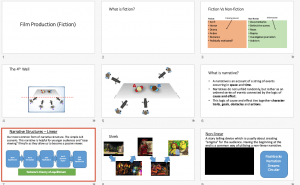
In the new delivery, more engaging activities based around genre were included – using detailed images, video and sound clips to explore mise-en-scene, sound, character and narrative.
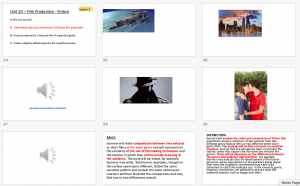
Old powerpoint/lesson: Even though writing structure was covered, it wasn’t done in as much detail as the new powerpoint/lessons as seen underneath
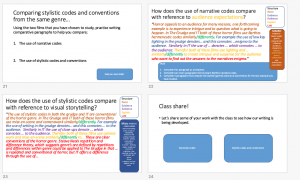
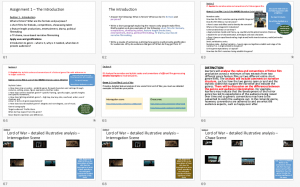
This is much more thorough, step by step, chunked for students, to allow their work to be more focused, as well as signposting to the PMD criteria along the way.
The work again, like Unit 4, was of a much better standard and quality as students were guided a little more, but also had a teacher led example to use, as well as picking their own example(s) to compare to; rather than just giving them completely free reign, where they then go off on tangents and the work is of a lesser quality.
Example work can be found here – all these reports got Distinctions:
Alex Unit 10 assignment MARKED
Sam Unit 10 assignment 1 MARKED
Toby assignment sheets edit01 (film) MARKED
Again, I am very happy and impressed with ZOL and her hard work with this, and it will certainly make a massive difference with our delivery of these intertwined units.
Comparing to BTEC delivery in other schools
This seemed a little problematic as this was something that I started to pursue just as soon as we went into lockdown. I composed a survey and posted it on various social media sites (such as Facebook) to try and gage how it was being delivered and also the attitudes towards the course – by teachers and students. This was available to over 1000 teaching staff, not all of which would deliver a BTEC course.
As I write this post, the survey has been open for over a month (started on 23rd April) and has only been filled in by 1 person – disappointed much! Obviously this doesn’t provide me with enough valid and valuable data, however, any opinion should be considered.
I have included some screen shots and analysis of some of the more significant findings below:
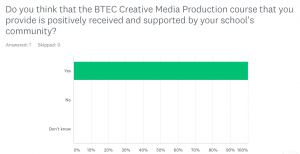
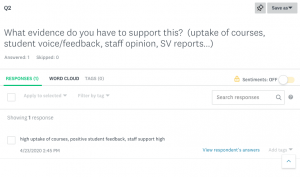
This response filled me with some confidence as there are many centres out there that do not share such as positive outlook on BTEC courses.
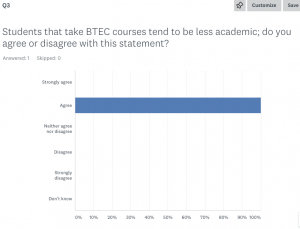
This is something that perhaps has caused a stigma or a skewed view of BTEC courses; this particular centre also required students at GCSE to get x4 4 grades to be able to do the BTEC course; we offer it at an APS of 3.83; due to the lower entry requirements – compared to A Level Media Studies, where we look for grade 6’s – something for me to consider for my presentation is to focus on the softer skills but also potential practical and vocational opportunities that the A Level does not have as much of.

This was very positive and pleasing to see and is certainly something I will endeavour to really play on in the presentation; it’s just as equal to A Levels!
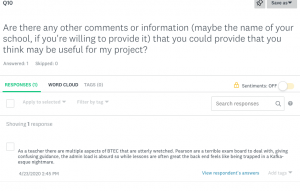
Lastly, it was great to see that the respondent is on the same wave length as me; the courses are potentially great – lessons also, but the hideous amount of paperwork and the somewhat backwards thinking by the exam board, at times, are very hard to cope with. Linking back to the potential 3rd BTEC option to offer on the curriculum, I can see why teachers would be put off from providing it.
Things to consider in the design of the presentation to be delivered to prospective Year 11 students:
- Focus on the positives!!
- Differences between A Level and BTEC – but make the BTEC seem more appealing!
- Focus on practical opportunities that A Levels do not
- Focus on the amount of students able to go to university and that the grades are equivalent!!
Feedback from concerned SJL staff
I wanted to carry out a focus group/interview with the Head of Business, Teacher of Business (both deliver BTEC Business) and the Deputy Head who oversees the curriculum to gage the perception of BTECs in the school, to see if there was scope for a 3rd National Certificate course and to draw parallels between the courses we currently run. However, due to the lock down, this did not take place, so I designed a survey to be sent to the above.
Unfortunately, only one person responded out of the 3, however, there are some useful things to take away from it.
I have taken screen shots of the answers and written a brief analysis with each one.

Even though the answer to Q2 included examples of a consistent high uptake in numbers and a positive SV report, I thought that this was an interesting answer; is there a lack of understanding lower down in the school? Is there an issue with student teacher/relationships? Is there perhaps a barrier between teaching staff – or a pre-conceived idea about the BTEC course that hasn’t surfaced or been explored?
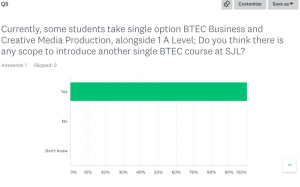
It’s nice to have an agreement here, as I really do think that there is a certain calibre of student that BTEC courses can cater better for as opposed to A Level courses; the question is, what other subject would fit with Creative Media Production and Business? Or what other subject would students be interested in taking alongside these 2 courses?
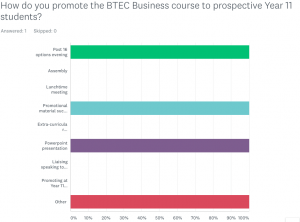
As you can see, the BTEC Business course is not currently promoted in Year 11 assembly, which is where perhaps my presentation to change the perception of BTECs could come in handy – not only as a recruitment tool but as a 2 pronged attack (very strong word!) to try and break the stigma that surrounds the course.

I really like the idea that we could perhaps have a BTEC area of the school, and given the time, money and resources, may be an excellent thing to invest in; however, something that has previously come up from a student voice/questionnaire is that sometimes the BTEC students feel cut off from the 6th form as they are fully immersed just with the students on that course – especially on the Extended Diploma course; other than Enrichment, PE and form time, which only happen for a minimum amount of time per week – not 15 or 18 periods (Year 12 and 13 respectively).
Unit 2
Another Unit we wanted to revamp was Unit 2, Working in the Creative Industries; there are 2 parts to this unit; firstly, students need to engage with jobs in the field of media and to make contacts with those who already work in the media. Secondly, students create a CV and make a show reel of their best work from the course.
In the past, we have left this unit until the end, partly because it is one of the easiest to tackle in the summer term, but also because it allows students to acquire information over the time of the course. The previous lessons can be found here: Unit 2 – Working in the Creative Media Industries
However, we had a new teacher join us in September who had an excellent vision of how to deliver this unit to our new, keen Year 12 cohort. I directed CBC to perhaps revamp and redeliver this unit in a more exciting and beneficial way, rather than it just being plonked on the end. CBC built up numerous contacts over the course of a number of months; from contacting parents of students who he knew had a job in the media industry, to his own friends. These ranged from scriptwriters on Eastenders, marketing executives in charge of famous campaigns such as This Girl Can, someone in charge of costumes and props on the set of The Crown amongst others.
Below are some emails to show him making contact with various industry professionals; he also made contact with a local school who were running a media careers day too.

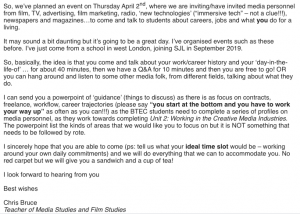

However, unfortunately, as you can see from the last email, this was scheduled to happen on Thursday, April 2nd 2020; schools were put into lockdown and closed the week beginning the 21st March. So, even though this didn’t go ahead, CBC has built up an excellent range of contacts that we can potentially use in the future when we deliver the Unit next.
This proved to be a very exciting opportunity for the students, and I didn’t want to squash CBC’s enthusiasm, so I let him run with the idea – theoretically, it would have been very successful! It was also part of CBC performance management, so it really allowed me to not only to check in on him, but also gave this project real purpose.
This is one change I didn’t plan for, so shows that the TLDW project can still have further outcomes. Furthermore, as this will now be taught/tackled next year, this will be part of the legacy.
TLDW meeting March 2020
The Emerging Story of Leading Change
We firstly reflected on ‘Davina’s story’ and thought about how her project was going and then compared it to ours.
See mine here:
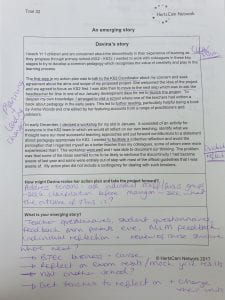

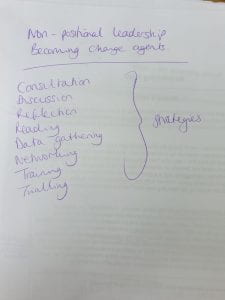
We reflected on delivery and feedback on our projects from the last MLM meeting which was very useful; I have already documented this in a previous post. It was enlightening and for some of us it meant a change in direction for our work/projects. As an existing Middle Leader, it was actually a good opportunity for me to actually lead something at this level; sometimes I find myself to be a passive attendee!
We then read an article by Michael Fullan which got us thinking about how learning and leadership go hand in hand – see my annotations below:
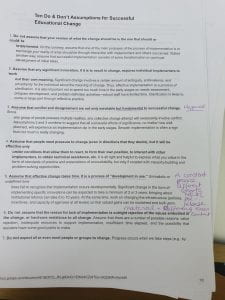
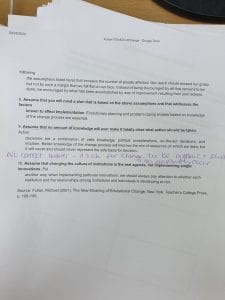
Numbers 3, 5 and 9 really resonated with me:
3. Assume conflict and disagreement are not only inevitable but fundamental to success and change; I found that this had already happened where I found a bit of resistance to either teaching BTEC courses, ignorance or stigma surrounding the course, or purely the fact that I disagreed with the lower results from the exams last year!
5. Assume that effective change takes time. it is a process of “development in use”. This shows that change is a constant process; not only in the guise of this project, but also beyond. It not only affects the current cohort in question, but future cohorts, differing exam content in the pre-release material and so on; this is all very much developmental and will take lots of time int he future.
9. Assume that no amount of knowledge will every make it totally clear what action should be taken. There’s no right answer! It’s ok for change, to change and be organic; it can be constantly evolving – especially when we deal with different children, cohorts and aforementioned, changing pre-release exam material/content year on year/exam series’.
We then participated in an individual Diamond 9 exercise to get us reflecting even more.
We were given the following cards:
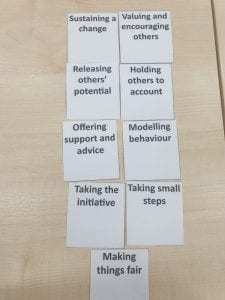
These got us thinking about our position in terms of leadership and also the qualities needed/strategies needed for our TLDW projects.

I organised mine like this; like with all Diamond 9’s there’s no correct answers! I think Influencing and inspiring others is important as a leader as you need to be a role model, get people on your side but also need someone to help influence change; obviously not too democratically or autocratically! Having a plan and getting others on board is important for my project as it is based around other teacher’s and student’s perceptions of BTEC courses, but also I need to have a plan to help deliver change for the BTEC courses amongst the faculty. Listening to Others, Caring and Dealing with conflict I put next as these are key qualities needed when dealing with people who are going to be at the heart of the TLDW project, but also, to be open to other ideas may help drive change, as well as caring about the project, but also dealing with conflict – whether that’s getting people on board, or changing perceptions of the BTEC course, in my case.
Reflection tool/record of participation
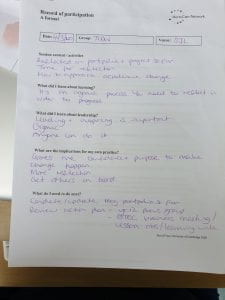
Retakes/exam results
Unit 5 retake results
MD; NP to NP
Unit 1 retake results
MD; NP to P FL; P to D
JR; NP to P
KP; P to P (an increase of marks though)
HJ; P to M
LJ; M to M (an increase of marks though)
There obviously has been a positive impact on the Unit 1 retakes and the use of lunchtime revision sessions to help improve these marks. So this implementation of something new has had a positive impact; we will await the current Year 12 results in August for the same unit to see if they have been any more successful. If they have, then this is on a per cohort basis, or it could the impact of the teacher; other wise the content delivery has been the same.
RE: Unit 5; despite a more one to one approach for this student, and the topic area being something he could really engage with, he still came out with a NP grade, and missed out questions. This is down to his exam technique and approach; there was nothing more I or CBC could have done for him, without interfering or writing answers for him…! The current Year 12 cohort will have undertaken the full 120 hours delivery and preparation and how to conduct research skills, as well as sat at least 4 mock papers, making them much more prepared. CBC has implemented a new strategy as instructed by me since September fort the Year 12 cohort; their results have been a lot stronger across the board; I will report on their mock results and final results when they are released in August.
Staff conference
Today CBC and I delivered a session on Creativity in the classroom; which combined both his and my TLDW project foci. The first part of the session was led by CBC and contained a number of different activities to get our attendees thinking differently about their approach to teaching and learning; could they get students to be more creative in terms of their thinking and outcomes of work; could they be more creative in their approach? The attendees undertook activities such as defining creativity, thinking outside the box of creating a bag out of a t-shirt, ways to approach creativity, discussion around how new curriculums have potentially crushed this idea, as well as a diamond 9 exercise to help gage what’s important in the classroom vs. creative approaches.
In my part of the session, I explored some of the creative work produced by some of our BTEC students from Unit 3 to help inspire the attendees; I know we are stuck for time in our oversaturated content heavy curriculums, , but why can’t we have fun, use a range of equipment, push students out of their comfort zones, and favour more practical outcomes, rather than just a written exam answer? I have included my slides from our presentation here: SJL Staff Conference – TLDW Session FINALpptx
I also found a very helpful quote to aid the focus of the sessions : David Gauntlett proposes a “vision of media studies based around doing and making – not about the acquisition of skills, as such, but an experience of building knowledge and understanding through creative hands-on engagement with all kinds of media.” (Gauntlett, 2015)
(The overall file is over 1gb and is too large to upload).
After this, I took the attendees down to our TV studio, which is primarily used by the BTEC students, along with ample amount of equipment such as cameras, lights and microphones. I had the studio set up with the help of the Media Facilities Manager to really show off the equipment as I wanted to really not only show them how to be creative, but also to advocate vocational learning. I had the studio set up as as newsroom, using the green screen, autocue and two cameras, as well as having the other side set up as a photography studio with lighting and an SLR camera. I also made the attendees experiment with just using the green screen and lighting – they even visited the moon!
Whilst doing this and talking through how to use the equipment, I was trying to give a number of inspirational ideas of how to approach their work and outcomes with students in a more creative way; produce a news bulletin on a particular topic; act a scene out in front of the green screen (meaning anything can go in the background), producing a script or radio broadcast – instead of an essay answer for instance, as well as storyboarding, filming and editing an advert…. and so on. I also gave the attendees the sheet below depending on their own technological abilities and know how to give them even more inspiration; green being easy, amber being medium and red being harder/challenging.

I was really complimented by the headteacher, so much so, that she suggested I run tours during the next MLM to help inspire other HOFs and to give them some more creative approaches to teaching. This was a great outcome, and certainly something that can be worked on in the future.
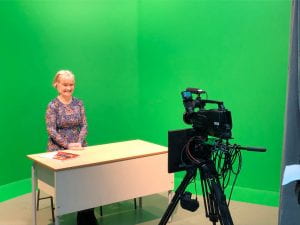



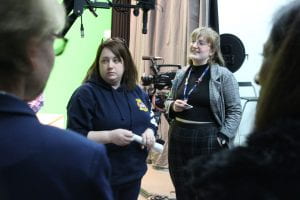
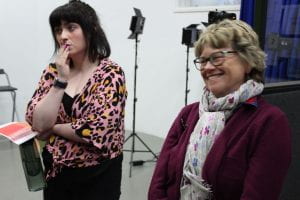
Although this wasn’t directly linked to the BTEC course, it certainly drew attention to the possibilities of these types of courses and the wide scope of work that could be produced by students, albeit implicitly.
Faculty review
The focus of the faculty review was on how vulnerable groups (SEN, boys, EAL, PPG…) make progress.
Feedback from my specific lesson (BTEC Level 3, Unit 27)
Strengths
Planning to meet the needs of the learners
Planning engaging lessons
Marking and assessment
Structure of independent tasks
Questioning
Areas for development
From this lesson I could suggest none
Not only is this very (!) pleasing, but demonstrates that perhaps I do just lack a bit of confidence with the overall delivery and structure – maybe it is ok and just needs a bit of tweaking? Or perhaps, we have learnt from many of our mistakes from last year and have already starter to make the curriculum better.
Another target/outcome of the faculty review deep dive was the organisation of boys folders – which again has tied in with previous comments and posts.
Parental feedback
Feedback from parents was collated and can be found here: Media Faculty Review Survey 2020. A total of 34 parents responded, from across a range of year groups. it should be noted that the findings below are not BTEC specific, but nevertheless, should be reviewed.
Some interesting findings included:
- The majority of parents either agreed or strongly agreed that their child likes lessons – 85% (question 2)
- The majority of parents either agreed or strongly agreed that their child is making good progress – 82% (question 3)
- The majority of parents either agreed or strongly agreed that teaching in lessons is varied and engaging – 80% (question 4)
- The majority of parents either agreed or strongly agreed that the faculty sets high expectations for students – 91% (question 6) – and to me this means that as a faculty we are striving to get better and be better.
- The majority of parents either agreed or strongly agreed that coursework produced by students was of a high quality – 91% (question 9)
- Exam preparation had a lower score of 67% in the strongly agree and agree categories (question 11) so I think this points in the direction of Units 1 and 5 last year for the current Year 13 cohort not having great outcomes; this has since been addressed through better planning of Guided Learning Hours (GLH) for Unit 5 starting in September, but also Unit 1 and 5 revision/intervention sessions.
The qualification structure
The responses about the structure and organisation of the qualification and individual units made me think about how we plan for it.
This also lead me to actually sit, count (!) and try and account for the amount of Guided Learning Hours for each of the Units, in terms of classroom contact, examination preparation and homework to see if it tallied with the specification properly.
It also made me question if the right teachers are delivering the right units based on their expertise and prevision experience. See attached spreadsheet.
This will also be done properly and rigorously for next academic year, and I may even consider using MyBTEC, an online portal which may make the organisation and management side of things better for teachers in terms of workload – but this will need to be in consultation with the rest of the team.
Reviewing Unit 4
One unit that I have personally been working on is Unit 4 – Pre-Production Portfolio. It is a mandatory unit, carries one of the highest amount of GLH (Guided Learning Hours) and weighting. I ended up teaching this unit due to a member of staff’s timetable changing and not seeing this particular BTEC class, who then left the following academic year.
I felt that previous cohorts’ work for Learning Aim A was really not up to scratch; consisting of a report of around 5 pages long exploring pre-production processes with a couple of pieces of paperwork annotated. To me, the quality of this was not good enough. The old Unit 4 lessons can be found on the link. I felt that these powerpoint slides were simply a thought process of the teacher, imparted on to the students, as opposed to actual delivered activities to get students to engage with pre-production processes, understand them, and then be able to explain, analyse and evaluate them (the PMD) criteria. I understand that the delivery of the course may suit a more lecture style based delivery, however that doesn’t fit with the SJL way. The Unit 4 Scheme of Learning provided by Edexcel is also very vague and alludes to this more talk and chalk style, as well as very independent delivery, which, in Year 12, I don’t think our students are quite prepared for. It can be found here:BTEC16_NAT_CMEDIA_SOW_U04
I revamped the lessons, and along with my colleague ZOL, combined this unit better with Unit 10 – Film Production, and with Unit 21 Film Editing. This made the scheme run more smoothly, allowed us to manage our time better, and allowed us to be more rigorous in our approach, which in turn, would allow more scope and opportunity for students to attain the higher criteria, and hopefully more Distinctions.
Version 1- Unit 4 and 10 Scheme of Work
Version 2- Unit 4 and 10 Scheme of Work REVISED
Final version – Unit 4, 10 & 21 Scheme of Work REVISED2
From this planning, I then redesigned the Unit 4 lessons – Unit 4 lessons (1)
This ended up going up to 154 slides; but lessons had been individualised rather than put in one big chunk of slides, along with activities for students to engage with various pre-production processes, with many references to the awarding criteria, rather than being simply a list of things. The resulting reports produced by the students were much more thorough, detailed, and were over 20 pages long in some cases; these were so much better than previous cohorts that I was actually scared of sending the current Year 13’s work off as in comparison, it did not look like it was enough!
I was very pleased with the new outcomes of the Year 12 work; 16 students received a Distinction; 3 received a Merit.
Student work can be found below.
Last year’s cohort – 2018/20:
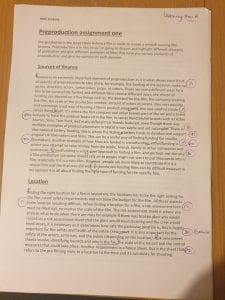
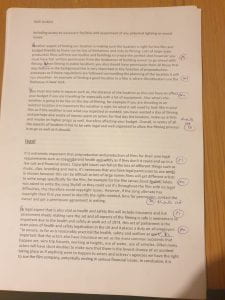
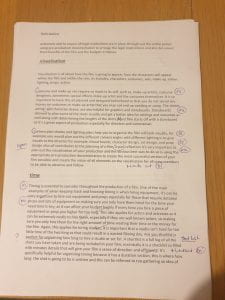
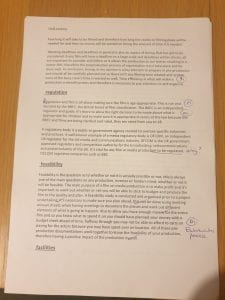

Only 5 pages long, 3 analysed documents (this is at school – hard copy), lacks detail and evaluation – achieved a Merit
This year’s cohort to compare: Unit 4 – Mrs Smyth
18 pages, 4000 words, multiple documents analysed, multiple examples given, highly detailed and evaluative – achieved a Distinction
Another example includes: pre-production_report2
Again Distinction standard as it comprehensively evaluates over the course of 16 pages and over 4000 words; lots of detailed examples which assists this.
Both of these students were not only guided better due to the rewriting of the scheme of work, but were also really signposted on the distinction criteria.
Faculty Meeting – February 2020
As faculty meetings allow for reflection on problems and how to rectify them, this was a prime opportunity to really sound out how to better prepared BTEC students for their actual public exams. As the real exams are usually so close to the mocks, in the past, we haven’t endeavoured to uptake this opportunity; however, this year, due to the poorer and disappointing outcomes from last year, we have decided that the current Year 12 cohort will undertake a mock exam in Units 1 and 5 respectively.
This decision was unanimous, but also democratic; we really weighed up the pros and cons, and even though it was my suggestion (potentially autocratic!), everyone discussed and agreed that more practice would not do the students any harm.
Meeting minutes can be found here: Faculty meeting Feb 20
Feedback from parents… so far…
I have had some lovely feedback from parents at both parents evening and from emails in relation to the BTEC course.
JR mum – very supportive, accommodating (he has SEN and anxiety and we are able to move the curriculum and support him in exams more so than if he was doing A Level).
LG mum and dad – very engaged, has received an unconditional offer for a university place which is fantastic!
MD mum – very supportive, good communication between teachers and home; student also listens and takes on board feedback better now.
TH mum – seen a change in her son – very engaged, enthusiastic. She wasn’t sure it was the right option for him, but now doesn’t even question it. I also received the email below:

AK mum and dad (Year 11) – I had a meeting with his parents, who have now been persuaded to undertake the single option BTEC course as it has an emphasis on filmmaking to compliment the GCSE Film Studies course he is currently undertaking as there is more of a focus on this on the single course. This also got me thinking about parent’s perceptions of the qualification too!
I will await the outcome of the faculty review to see if there are any further parental comments.
MLM feedback
I presented my thoughts for the TLDW at the Middle Leaders Meeting where I sought feedback from other Middle Leaders (HOFs and HOYs) as well as members of SLT.
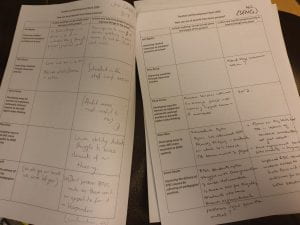
I have summarised the feedback below:
- Librarian – not very helpful feedback, but I guess it could be used; is there a way that library staff can assist in any lessons or support with providing resources – this could link to the research side of the work – ie. learning aim As, but also for the delivery of Unit 5 which is partly based on research skills – something to bear in mind for the legacy perhaps.
- Head of Science – used to do an Applied Science course but stopped it partly because of the sheer amount of paperwork. He also raised the point;”Do students in the school have a view that BTECs are easier?” – which is certainly something I want to endeavour to change and have started to take steps with this with the recruitment of Year 11 students.
- Head of Computing – isn’t doing BTEC because… “I’ve heard the admin/paperwork is a nightmare” – and she’s not wrong!
- A drama teacher, HOY – doesn’t want to change to a BTEC course as it may implicate current classes – we did find this with the introduction of the single BTEC course; we lost an A Level class, however, our numbers did remain steady (academic year 2020/21, we have 2 A Level classes, a Triple class and 2 single BTEC classes – a bumper crop of numbers!) . She also stated that in terms of vocational learning, that she can provide this through extra-curricular activities. I find this odd considering there are parts of drama that are really hands on…
- Music teacher – wasn’t put off by the fact of offering a BTEC course, but was worried that there wouldn’t be enough numbers to run the A Level alongside it; I guess because it is such as niche subject compared to other options available, and has a particular reputation and pre-requisites such as grades required. However, they did state that there would be perhaps more “relevant musical opportunities and experiences away from the traditional taught syllabus”.
- Member of SLT – Apparently, BTECs are frowned upon at SJL and are seen “not as academic enough” in the school context – they did admit they didn’t have as much knowledge about the BTEC, but I found this comment interesting. If teachers are having this opinion of subjects in the school, then surely it may perpetuate amongst other staff and then on to students…? Is it an ignorance, a really not knowing about the subject problem…?
- Head of Tech – stated that “there wasn’t an appetite for it in Harpenden (construction etc).” Again, is this an ignorance thing, or is it a bigger, wider class issue in the area; parents who have attended Higher Education and probably undertook A Levels have a certain attitude towards these EQUIVALENT subjects…? Head of tech, a vocational subject, I find interesting…
- SENCO – Very supportive and stated that BTEC could provide “results and widens access to 6th form and improves outcomes for some SEN students” – a very positive comment, but again, is restrictive as it isn’t geared towards weaker students, or those with SEN. But, she did acknowledge that the organisation of the course is something that students have struggles with in the past.
- Head of MFL – there’s a lack of vocational opportunities on her curriculum and are no vocational qualifications – perhaps this is an area I could pursue and inspire other teachers with some ideas?
- HOY, also a PE teacher – stated that PE did do the BTEC qualification… but no other reasons why they don’t do it any more…
- HOY, also a PE teacher – stated that “teacher well being [was an issue], the amount of marking does not blend well with our fixture schedule.” I understand these demands, particularly for a ‘heavy’ extra-curricular subject.
- Anonymous – Did BTEC for 2 years – workload was questionable, lack of challenge at the higher end – I find the last comment odd as the BTEC is what you make it – you can make it harder for students to achieve the Distinction criteria if you wanted to…
TLDW meeting – 14th January 2020
In this session we reviewed our action plans and progress so far. We also had a chance to reflect on our leadership style and what we are learning about leadership and learning during this process.
The picture below represents what I am feeling right now; I have lots of ideas, don’t really know how to narrow them down at the moment, and don’t know what the outcomes will be!

We discussed and reflected on these qualities with our style of leadership and projects so far. It allowed us to be reflective but gave us a sense of reassurance as during this process we would move up and down these scales, but it also depended on the topic of the TLDW project.
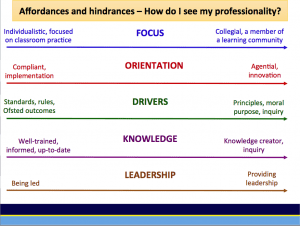
Focus – for me, this led to being more towards the right hand side as I need to get a lot of the school community; teachers and students in the upper school on board with my ideas – such as changing the perception of the qualification.
Orientation – this sat in the middle as I need to IMPLEMENT something that is going to be a bit more INNOVATIVE on the BTEC course
Drivers – again this sat in the middle as we are governed by things like OFSTED, however the project is driving something more purposeful and opening up new inquiries
Knowledge – again this sat in the middle as, specifically for my TLDW, although I have a very secure knowledge of the course, there’s still elements of inquiry and readdressing of that knowledge that could take place in order for the delivery of the course to get better and more coherent.
Leadership – this sat more towards the right as I am providing leadership to drive change; however, I guess at times,
I will be led by outcomes of things such as the results from consultation; surveys, questionnaires, discussions etc.
Further reflection made me think about what’s holding me back, barriers, organisational set backs and personal barriers – see below:
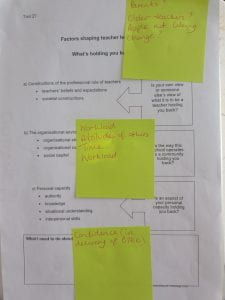
After further discussion with 3 colleagues in the meeting, many comments were made that I need to consider for my project:
- “There are such different skills being assessed between the A Level and BTEC courses”
- “Bridging the gap between GCSE and A Level – is this bigger than BTEC? Are expectations too high and how do we tackle this?”
- “What’s the reception like of BTEC courses in academic schools? Could check with BeauSandVer consortium – is there anyone to consult?”
- “Other people to consult include GWI (curriculum), CRI, DTH, JHJ (6th form team and careers), RHO, CRE, VMA (HOY and SSM for Years 10/11; any low ability students to take the subject?”
- “What is making the delivery of BTEC and A Level so different? Is it the content or the level of the courses?”
- “What are the BTEC students aiming for? Do they ned concrete examples of what the course leads to? Can you contact previous students?”
This is all food for thought and needs to be considered in my next steps.
Reviewing action plan:
My review can be found here: Reviewing action plan
SWOT analysis:
The analysis can be found here: SWOT analysis tool
Key Questions:
1.How did my action plan change as a result of consultation with colleagues and others?
A few revisions need to be made; perhaps I need to scale my plan back slightly – have I bitten off more than I can chew? Could more work be done next year as part of the project’s legacy? However, I was complimented on the organisation of it, as well as its logical sense.
2.What challenges am I facing in leading my development project and what adjustments do I need to make to take my development work forward?
My project is too big and needs scaling down; I think there will now be 3 possible/plausible outcomes. To compare to the Business BTEC course and to ensure our delivery is on par, but to also improve the quality of delivery on our course with certain units based on exam outcomes last year; and to re-educate the school community about what a BTEC actually is.
3.How successful is my leadership of development work so far?
I think I have been driven, and have directed staff appropriately in the development and better delivery of the course so far – ZOL with Unit 4, CBC with Units 2, 5 and 11 and myself for Unit 4 for instance; we have reworked these assignments and have/are starting to receive better outcomes because of it..
4.How well am I documenting the process of leading development work?
I think the blog is a great, easy and instant way of documenting the process and I have tried to keep it up to date so far. It also means that you can comment on things in real time, making it manageable.
5.How can I widen my consultation process?
I would like to ask other colleagues in other schools about their delivery of the BTEC course; I would also like to consult the Business faculty as they also delivery a BTEC course and would like to compare what we do.
6.What am I learning about leadership and learning?
It happens continuously and helps to drive change; even though we are educators, there still has to be an element of us learning in order to reflect and change!
Reflective tool/record of participation
Refection can be found here: tool_21_record_of_participation_format
Teacher questionnaire responses
I then wanted to get the media teacher’s opinions and thoughts about the BTEC course; I thought this would also narrow down my project further and consider a real area of development to focus on.

This teacher states that although there is are great opportunities for practical and vocational work, the qualification is very paperwork/workload burdening compared to the A Level for instance. Ie. each learning aim needs to have a brief that is written and then approved by another teacher, and Pearson Edexcel itself, each learning Aim has at least 3 outcomes – some have 4; each of which take hours to teach and for students to create a piece of work to be assessed on; which each learning aim has to be IV’d by another member of staff, before it could then be called up to be moderated by the SV. This has to be done 9 times (9 internally assessed units)….
The teacher also alludes to the fact that there could be more creative opportunities and less report writing. This ties into the revision and review of the course.
The current cohort in Year 12 are much better; is this because the TLDW has already had an impact and revisions to the course have started to be made due to better planning? Unit 10 and 4 for instance, as well as exam preparations starting much earlier?
This teacher also mentions that in the past they have found that BTEC students perhaps are not supported in the same way as those undertaking A Levels – they are called “BTECERS” which labels them; there is also a stigma of the word BTEC and younger students have been using it as a colloquial term to describe something that isn’t up to scratch or second class.
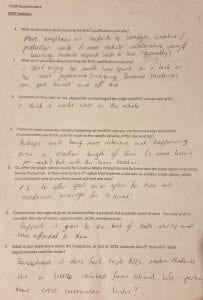

This teacher puts a lot of emphasis on the creative and vocational nature of the course and uses the phrase “adult collaborative way of learning” – this proves that other skills are utilised on this course such as communication, co-operation, teamwork which reflects professional practice compared to the A Level which is more academic and critical. Again, there is another comment about BTEC students perhaps not being as integrated into 6th form/school life as other students. Although this seems like an area of development, I want the focus of my TLDW to be more curriculum as opposed pastorally focused.


The third teacher, new to the school this academic year, has also commented on the complicated paperwork and the difficulty of the logistics of the course, however is very complimentary of the way the course and qualification have been set up and are administered already. He also comments on the fact that perhaps it could be a bit more creative and involved the Media Facilities Manager (MFM) more so from a technical perspective – which I agree with. In his answer to question number 7, he also states that the triple BTEC students are ostracised compared to other 6th formers, and that we do need to work on the BTEC’s perception across the school; so perhaps, a possible outcome of this project is to also think about strategies of how to raise the profile of the qualifications, particularly to Year 11 before choosing their options.
Faculty meeting – January 2020
It was further discussed between the faculty members that in particular that Units 4, 10 and 21 needed to be better planned and needed to have more of a sense of coherence and continuity between them. ZOL and myself have taken it upon ourselves and decided to rejig the lessons and the scheme of work; Unit 4 Learning Aim A has already been completed, as has Unit 10, A, and we are much happier with the overall outcome. Next steps are to figure out and redraft a better scheme of learning. This also fits in with one of ZOLs PMR targets.
Faculty meetings are not only great ways of getting the team together and to discuss, problem solve and even celebrate successes, it is an opportune moment to really engage with vision and leadership as a Head of Faculty, and to have dedicated time for this.
Meeting minutes can be found here: Faculty meeting Jan 20 (1)
Further reading: BTEC and Vocational Learning
I decided to have a look back through some old books from my PGCE course about media education; these date back to when Media Studies was a subject that was supposed to ‘inoculate’ students against the effects of the media (Masterman, 1985), however it has evolved into a subject that allows students to be critical of the media, but also producers of the media too.
I decided to focus my reading around BTEC courses and Vocational Learning. It was interesting to read about older perceptions of these types of courses. “The great risk of practical work [offered by BTEC courses], it is argued, is that students will simply learn to ape the professionals, and that a critical, analytical perspective will be lost.” (Alvarado and Boyd Barrett, 1992:69). The rigour and critical analysis is obviously something I want to bring back with the focus of my project, particularly if I think about brining it on par with the A Level course. furthermore, it was these aspects where students fell down last year in terms of the disappointing grades achieved; not the internally assessed units that are majoratively practical. They go on to say “Conversely, some progressive educationalists have adhered to the notions of creativity, in which the purity of the experience of practical work has appeared to be unsullied by the dirty work of critical reflection.” (Alvarado and Boyd Barrett, 1992:69) This is interesting as the BTEC course has to offer these 2 key areas; creativity and critical reflection/analysis; students need to research and analyse existing texts, in order to create something that is informed, and then to further reflect and evaluate its successfulness – this is reflective of industry practice – the purpose of vocational courses and learning.
Furthermore, the nature of the students that are attracted to the course, or who are put on the programme of study, tend to be more ‘average’ in terms of their achievements and/or lower ability than those who take up A Level Media Studies. My argument really is supported by Alvarado and Boyd: “They [Vocational media courses] require collaborative work within which individuals might be expected to display communication, presentation or performance skills in front of camera, technical skills in operating equipment, social skills in organising a crew and performers, and on top of that develop ideas as to the form of the finished product. It is no wonder that students of average ability find it a daunting prospect.” (Alvarado and Boyd Barrett, 1992:76) On par with A Level; harder than A Level’ or offers a different experience? McDougall raises another excellent point when comparing Level 3 qualifications; “A National Diploma Moving Image student will spend roughly fifteen hours a week studying films and television. An A Level student might (at some points in the course only) get three, if they are lucky. How can the former fail to become more scholarly than the latter?” (McDougall, 2006, 153). This is certainly something that I want to advocate, and I know some of the team will too.
Another interesting point that is raised, which I think will help to gage the perception of the subject, goes on to state “The overall aim is the establishment of an ‘integrated programme’ of certification in education, training, and work experience, to make education more relevant to the adult world of work, and to break the disparities between academic and vocational qualifications.” (Alvarado and Boyd Barrett, 1992:191) I think this is exactly how Level 3 qualifications should be seen at SJL and could help the perception of BTECs.
References:
- Alvarado, M., and Boyd-Barrett, O., “Media Education, An Introduction,” BFI, London, 1992.
- McDougall, J., “The Media Teacher’s Book“, Hodder Arnold, London, 2016
Action plan
Below is a link created on a site called Padlet to demonstrate my steps on obtaining information, facts, figures, material etc. to help you tackle my TLDW project. The steps aren’t necessarily in order at the moment, but are certainly steps I need to take.
Year 13 initial responses
I put together a questionnaire for Year 13 students to answer as an initial starting point; I would like, from here to ask the Year 12 students of their perspective/take on the course, but also teachers too.

This response detailed the reason for taking the Triple option at SJL was a better experience and had more appeal than going to college. The delivery of the content is appreciated and expected, and part of the reason for undertaking the BTEC was because it was more coursework based. A suggested improvement was co-taught units; this could potentially be an area of development and could allow me to review the delivery and structure of the course and SOL – particularly where Units 4,10 and 21 are shared.


This students response was very interesting to say the least – and was perhaps too honest! The students raises a few concerns with the treatment of the BTEC students, how the 6th form or pastoral system doesn’t seem as inclusive and the pressure to go to university rather than explore apprenticeships and employment options. This could be an area of revising the structure of the course; Unit 2, Working in the Creative Media Industries is all about employment opportunities and jobs – perhaps this could be taught earlier, or at the end of year 12 before UCAS applications are made to give BTEC students more future options and direction.

This student also alludes to not co-teaching units, but also implies the organisation of units and work could be better – this is something that would make life easier for both students and teachers as the course is very content heavy. This is where I think the project could be really beneficial in terms of restructuring and organising units – weaker ones I think include Units 4, 10, 21, 2, as well as spending longer on exam based units as per the Guided Learning Hours (GLH). This student’s response also highlights the focus of going to university rather than exploring other options, so the re-structure of delivering Unit 2 should be considered, aforementioned.

One reason this student has chosen BTEC is to take the stress out of his choices due to the coursework heavy nature of the course. It’s very interesting to note that this student feels no different to any other 6th former; is it because he does 3 subjects and not just the triple option, so has more chance of integrating with other students and teachers? It’s also interesting that this student takes 2 BTEC courses – the other in Business (along with 3 other of the single option students). It is clear that there are some similarities in the delivery and style of these qualifications. Something I would like to pursue in the future, as already stated in the action plan, is to meet up with the business teachers and perhaps organise learning walks/lesson observations.

This student’s reasons for taking the BTEC was because of the higher proportion of practical work which compliments its vocational nature. A suggested improvement, (again!) has been about the course organisation, so I think this is definitely worth considering as a project outcome.
TLDW Meeting – November 2019
Although I was absent for this meeting due to ill health, I was able to catch up at a slightly later time.
The main focus of the meeting was thinking about how my concern developed as a result of consultation. I will be in consultation with Year 13 BTEC students, their parents and media teachers. Particularly as this project is focusing on an improvement within the faculty, seeking consultation, feedback and opinion will allow me will allow me to review these suggestions and have an insight in to where improvements could take place. There will also be a point later on where we have a planned faculty review where I hope to get some more student and parent feedback (although this may be geared more towards the whole faculty than by BTEC course).
I fond this table particularly useful as it will allow me to gage how to approach the consultation process, what strategies to use but to also reflect and keep track of the progress I make.
| Consultation
Sounding out colleagues, having a conversation with a mentor, asking advice, seeking permission, reassuring, testing out ideas, finding out what has happened before, establishing trust, etc. |
Discussion
Clarification of the problem, identifying the issues, reviewing practice, joint planning, agreeing priorities, exploring other’s understandings, interpreting data together, etc. |
Reflection
Keeping a diary, thinking it through, reflecting with a mentor (see consultation), etc. |
| Reading
Searching for accounts of similar projects, exploring the research literature, looking up official advice (DfES website for example), googling, etc. |
Data gathering
Observing lessons, interviewing pupils or colleagues, pupils’ diaries, teachers’ diaries, focus groups, listening to group activities, analysing pupils’ work, reviewing documentation, auditing practice, surveying, etc. |
Networking
Visiting other subject departments / teams, visiting other schools, emailing HertsCam Network members, emailing individuals discovered through reading. |
| Training
Running a workshop, coaching colleagues, arranging mutual observation, distributing guidelines, briefing colleagues, etc. |
Joint work
Planning in a team, making materials together, designing a data gathering exercise, collaborative teaching, etc. |
Trialling
Trying a new classroom activity, experimenting with a new teaching technique, focusing on a particular aspect of classroom activity, adopting and adapting new materials, etc. |
I am planning on consulting other colleagues involved such as Media teachers, 6th form team, Head of Curriculum and Business studies teachers; consultation with students to find out how the course can be improved will also be worth while. This will allow me to further discuss and sound out how to improve the course further. In terms of data gathering, I would like observe some lessons/carry out learning walks with the Business Studies teachers to see if what we do is on par with their approach; perhaps there is something to learn from here? In the future there will be further opportunities for collaboration and training – perhaps I can run something at the staff conference, as well as undertaking joint work with colleagues int he Media faculty to improve the units we deliver.
Another focus of this meeting was about thinking about how to tackle the TLDW project in smaller stages and to compile an action plan. This is something that I will consider and work on, and present in a further post.
One of the last things I had to consider was what impact my project could have.

This project could potentially be huge; I need to narrow down to a specific unit or units to change and develop; otherwise I could rewrite the whole course of 13 units! Secondly, the impact could be huge as it could change the way the whole faculty approaches how to teach the BTEC course and its units, and will impact at least 4 other teachers, let alone the cohorts of students that we will get in the future. The impact could also affect the Business Studies faculty if we find a chance to share strategies, but also perhaps the curriculum offer (only 2 BTEc courses exist at the moment), or even the treatment of BTEC students in the 6th form, thus affecting the pastoral team also.
Record of participation:
this was a good opportunity to start thinking about the refinement of the project but also to consider how it can be chunked to be more approachable when it comes to designing the action plan.
In terms of learning about learning, in order for change to happen, there needs to be some consideration and consultation otherwise you may become a “bull in a china shop.” I am learning a lot about organisation, but also more about my role as a middle leader. In terms of leadership, well, anyone can do it, however, change does take time and you need to get people on board – that’s what good leaders do; they consult!
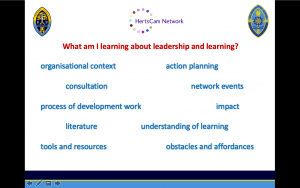
Implications for my own practice include organisation – both time to do it and to be organised, developing resources and evaluating impact – what worked, what didn’t work but also what’s a priority, and what’s not.
What’s next?
- Refine focus or project
- Develop action plan
- Start the consultation phase
- Start reflecting on responses
Initial Reflective Statement
Emma Smyth – Sir John Lawes School
I have been teaching for 11 years and have been a Head of Faculty for 8; currently working at SJL for 5 years. I have a BA (Hons) degree in Film and Television Production and practical work excites me greatly and I found it a great shame that the new A Level and GCSE syllabi reduced the NEA (coursework) from 50% down to 30%; this is where the Level 3 BTEC course really excites me due to its vocational and indsutrial focus and practical opportunities.
Values and concerns
An issue I felt that the faculty has after the results from summer 2019, was from out Year 12 (now Year 13) BTEC Triple cohort; there are only 4 boys, however, we got our first Near Pass Grades – ever. As I am one who strives for success, I felt that this simply wasn’t good enough in line with our previous, outstanding and exemplary track record. Now take into account the Single cohort of 6 students, 3 of which received Passes, which again, I felt wasn’t good enough.
After doing the exercise in Tool 7, I realised that achievement, creativity, curiosity, independence were some of the qualities that I felt were most important within teaching and learning. Then, when thinking about how this transpires to the concerns I have for BTEC students, it was – how independent are they? Are they using their time effectively? How ‘vocational’ should the ‘vocational’ course be? Have teachers got complacent in their teaching? Are there other ‘contextual’ issues that we can blame; student absence, student need, teachers leaving, teachers lacking confidence in delivery…?
The School’s Development Priorities
One of the main priorities is closing the achievement gap between boys and girls; given that there are only 2 girls on the entirety of the Triple and Single course out of 10 students, this is obviously a huge focus and will have a huge impact on the outcomes of Level 3 qualifications at the school.
Having high expectations of students; again this will definitely feed into the Year 13 group, but probably more so with the larger Year 12 cohort (just because Year 13 have already made some choices about where they go to next year), however it doesn’t mean that we can’t not push them to realise their full potential.
And lastly: Ensure the BTEC course and units are robust and delivered to the best capability of staff. This is a faculty specific priority/target that I added in light of the not so great results.
Strengths and Needs
The BTEC is a qualification that was new to me upon teaching at SJL; the opportunities from the course are brilliant and are in line with industry expectations. Students can study a plethora of media sectors and platforms, carry out research, write reports, carry out presentations, make amazing products. It’s only been in the last 2 years that external assessments (exams) have been introduced, and I think this is a weakness; students want to take this course because of its ‘vocational-ness’.
I also query it’s management of delivery (from an Exam Board perspective; it is very different from more traditional A Level and GCSE courses) and from a teaching perspective, it is a nightmare (lack of a better word!) to manage 13 Units on the triple course; writing assessment plans for each internal unit and accounting for every single hour taught, and timing each deadline. With each learning aim, this accounts to 30 different deadlines over the 2 year course, not including homework or the external assessments, some of which include pre-release material – it is a workload overload as Lead Internal Verifier – and I hope to crack it this year because of this project.
I wear my heart on my sleeve which has its benefits, but I think striving for perfection, which is unobtainable, perhaps makes me think I need to be a little more realistic about the outcomes for the students; but when faced with high target grades generated by the ALIS tests, this both helps and hinders student progress.
Values and Interests
I am committed to still getting outstanding results for the BTEC students and for SJL; it’s a course that I want to keep on as a legacy of the Media Studies Faculty. I feel with great communication, reflection, great ideas, innovative teaching and good, visionary leadership, we can make the BTEC great again!
Consultation
With Year 13 parents evening coming up, I would like to discuss some of my concerns with the parents and get their take on why some of the students did not achieve so well. I would also like to explore further how other, more ‘vocational’ courses such as the BTEC in Business and more practical A Levels such as Art, Photography, D+T, Computing use teaching strategies – how much is teaching, how much is creating, how much is ‘getting on with it’ and down to the students and their responsibility? Lastly, I would like to consult both students and teachers about their perception of BTEC qualifications – there seems to be a stigma around the subject (I occasionally hear KS3 + 4 students calling something that is not good, or second grade as ‘BTEC’) – has this impacted on the attitudes of students towards the qualification, and then on to the students sitting the course, which in turn makes them feel undervalued?
TLDW Meeting October 2019 and reflection – the emergence of the project…
During the meeting we clarified what our values were:
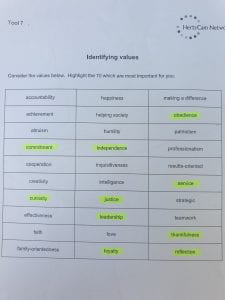
This was a useful exercise as it got us to reflect on what types of people, teachers, practitioners we are, and perhaps this would steer us in the direction of what the focus of our project should be.
We then used Tool 8, Clarifying values and concerns: towards an agenda, which allowed us to really think about what our project could be on; how useful it could be, how we could bring about change, what power we had to do so etc. These were a series of questions that again allowed us some thinking and reflection time, which we do not have much of in teaching!

Record of participation:

After a productive and reflective meeting, I really clarified what I wanted the focus of my TLDW to be.
I realised that although I am a Head of Faculty, I can really lead change in my department and inspire my team. After some disappointing results from our BTEC courses last year, I realised that this should be at the forefront of improving the department. After a nice reflective exercise about what leadership is, I realised that I sit in the middle; I am a bit democratic, and autocratic; but I think in education, when driving constructive change, you need to get your team on board and make the changes manageable and meaningful.
One quote that resonated with me was :
“Change is not only possible, but also a moral obligation”
Frost, D., Improving the quality of education through teacher leadership: a non-positional approach, 2014.
Due to our not so good results (by our past standards, and my own – I’m a bit of a perfectionist and always strive for the best (possible weakness?!)), we received in the summer, some Pass grades that we aren’t used to , and 2 Near Pass grades; I realised that the faculty and I have a moral obligation to improve the delivery of the course and to offer more support to the students.
Secondly;
“Leaders are the key people in changing and improving the culture and performance of the organisation. Leaders provide the role models for the rest of the institution.”
Wilshaw, M., Ofsted Annual Report, 2012.
This also resonated with me as students needs change, students year by year contextually change, teachers come and go, school targets change…. therefore teaching needs to be adaptable and we need to improve the culture and the performance of the students on the course.
I then decided to carry out some initial reading to try and think about the direction of the project. I read around the meaning of BTEC and the purpose of the Level 3 qualification, and why/how it is different to more traditional and academic A Levels.
What is a BTEC and why is it seen as a popular alternative to A levels?
https://blogs.spectator.co.uk/2016/09/problem-btecs-response-pearson-plc/
This made me consider some of the strategies that we use on the A Level course compared to the BTEC course, and perhaps there needs to be more parity between the 2 – they are of the same Level; 3. This also got me thinking bout raising standards and, the second article was about closing the gap for BTEC students from Level 3 to university; ‘Over 10 years, 13% of students with BBB at A-level failed to complete their degree course at the first attempt. The figure for those with equivalent BTECs was 27%. For those with CCC at A-level or equivalent, the gap is even bigger, at 17% compared with 37%. At BBB-equivalent grades, holders of BTECs are 16% less likely to land a first or a 2:1. If they have the equivalent of CCC grades the figure is 25%.’ Is a significant quote, with many significant statistics, so it got me thinking about how we raise standards and expectations with these students, which hopefully in turn, will mean better outcomes.
Faculty meeting
I have attached our meeting minutes from the October Faculty Meeting as it was discussed that the delivery of Unit 4 wasn’t working, and also gave us a chance to discuss and put interventions in place for Unit 1 and Unit 5 retakes (lunchtime revision sessions and Year 13s to attend the Year 12 lessons).
I’ve added this as it was the initial time a problem was flagged and made me really consider how we can reflect on pedagogical practices to improve the delivery of the BTEC courses as I wasn’t happy with the outcomes from the 2018-2020 cohort in the year of 2019. It also made me really think about how we can prioritise the more inadequate units and which staff could be divided up to help and engage with a potential idea for my TLDW project.
The minutes can be found here: Faculty meeting Oct 19 (1)
Hertscam Network event – 8th October 2019
Welcome event @ Barnwell School, Stevenage
The address was very positive and listening to others talk about their experiences on the TLDW and MEd programmes was inspiring.
We then did a carousel activity whereby we went around and visited posters that other teachers had made based on either last year’s project or what they want to do for this year. I visited:
- Primary school focus- how to promote whole school literacy
- A Level Maths and how to deal with specification changes
- Creative approaches to teaching – Maths
- Using technology in the classroom – Computing
It was great to meet other professionals and some of the topics I saw were useful; the projects with a focus on creativity made me think about my subject and its loss of/narrowing how much creation now happens with regards to the NEA; the technological approach to things such as online submission and marking in Computing made me think about how this could cut down teacher workload; I guess old habits die hard and there’s nothing quite like having a piece of paper in front of you to mark it! The specification changes (in Maths) is something we have had to deal with recently, however it is still in its infancy – only second cohort through – so it is still early days to make a decision on whether what we are doing is working or not; saying that, our results from the first year through were VERY positive.
I then attended workshop – based on creativity – led by a drama teacher. However, it wasn’t what I anticipated it to be, and honestly, was not very useful; it focused on SEN students and extra-curricular activities which doesn’t really fit in with many of my interests.
This experience has given me some food for thought in terms of what I want my project to focus on, but also how to set out the project and the processes involved.
Record of network activity can be found below:
